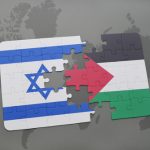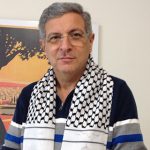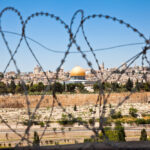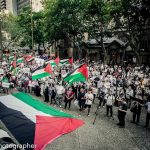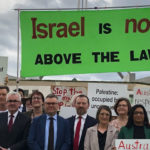Boycott Israeli Apartheid: An Interview With BDS Australia’s Nasser Mashni
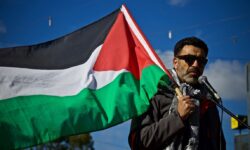
Increasingly, the use of the word apartheid is being applied to the system of governance that’s currently operating in the nation known as Israel and the occupied Palestinian territories – the land of historic Palestine.
In mid-2018, the Knesset (Israeli parliament) passed the Nation-State Law, which officially relegated Palestinians in Israel to the rank of second-class citizens.
The legislation stipulates that only Jewish people have the right to self-determination, enshrining a pre-existing system into law.
While Israeli PM Benjamin Netanyahu indicated in June that his nation will press forward with the annexation of up to 30 percent of the West Bank. And after recently promising Gulf nations that it would drop the plan, Israel stated it was moving ahead with over 2,000 new settler homes last week.
Meanwhile, the third most densely populated place on Earth, the Gaza Strip, continues to operate like an open-air prison, as the region has been under an Israeli and Egyptian enforced land, air and sea blockade since 2007.
The blood of Palestine
Next month, the 2020 Electronic Warfare Europe arms fair was set to take place in the city of Liverpool in the UK. And Israel’s largest private weapons manufacturer Elbit was one of the fair’s global sponsors.
A coalition of Palestinian organisations and antiwar groups, including the BDS (Boycott, Divestment and Sanctions) movement, led a sustained campaign against the fair, which caused Liverpool City Council to cancel it, and eventually agree to a policy banning such events in the future.
Elbit specialises in the development and manufacture of military electronics, surveillance systems, drones and security systems. The company promotes the fact that its weapons and technology have been tested in battle, meaning upon Palestinian populations.
The BDS movement has long been calling on entities around the globe to boycott Elbit products. It notes that the weapons company contributes to two facets of Israeli occupation: indiscriminate assaults on civilians and “the ever-tightening ghettoisation of the West Bank”.
Growing international resistance
Established in 2005, Boycott, Divestment and Sanctions (BDS) is a Palestinian-led global movement that allows individuals, companies and governments to take a stand in upholding the human rights of Palestinians by withdrawing financial support from Israeli entities.
BDS Australia is the local chapter of the global campaign that employs a strategy based upon that used by last century’s Anti-Apartheid Movement, which placed such pressure on South Africa’s De Klerk government that it ended its racist system of heavily enforced segregation.
Sydney Criminal Lawyers spoke to BDS Australia committee member Nasser Mashni about the growing prominence of the use of the term apartheid in relation to Israel, why Gaza continues to be bombed during the pandemic, and the very real impact the boycott movement is having.
Firstly, this year has seen the coronavirus sweeping the globe, which has led whole nations to lock down.
Well-funded health systems have been struggling to deal with the pandemic, but in the occupied Palestinian territories healthcare services are limited in the first place due to Israeli restrictions.
Nasser, how have Palestinian communities in the occupied territories been coping with COVID-19?
Like the rest of the world it has been a tragic situation, particularly for Palestinians, because they’re so close to what’s arguably the First World, in what they can see in Israel.
It is also really tough on them because a huge chunk of the Palestinians in eastern historical Palestine – or the West Bank – work at or are connected to Israel, and it has closed down the border. They won’t allow workers to go across. So, economically, there’s been a huge slump.
A challenge of occupation is that our hospitals – Palestinian hospitals – have been underfunded and under resourced for 70 years.
So, the best healthcare is at Palestinian hospitals in East Jerusalem, but with the apartheid wall, access to those hospitals is severely constricted to the Palestinians of the West Bank.
This is to the point where one of the most recognisable Palestinian faces on the international stage, Saeb Erekat – our chief negotiator with the Palestinian Authority – is in a critical condition.
There aren’t any Palestinian hospitals that have the capacity to deal with where he’s at: very close to death apparently. So, he’s been transferred to an Israeli hospital to receive the urgent care he needs.
Of course, that wasn’t well received by some members of the Israeli Knesset. In fact, these members of the Knesset suggested that he should not be getting any medical aid at all.
That’s on the West Bank. Having a look at what’s happening in Gaza, thankfully, one of the benefits of being the world’s largest open-air prison that is Gaza, is that it took a long time for the virus to get there and Gazans are used to living in lockdown.
So, it was initially kept under control, sadly it has now gotten out.
There were reports last night that there were 77 new infections. The real challenge for Gaza is there’s less than 100 ventilators. And the hospitals there run short of medicine on a normal day and have only intermittent power due to Israel’s destruction of the only power plant in Gaza.
The population density in Gaza is over 5,500 people per square kilometre, with the same population density Australia would have 42 billion people. So, if it gets out, and is not managed it will sweep through there like nowhere else on Earth.
At the end of June, prime minister Benjamin Netanyahu indicated Israel will be pressing ahead with plans to annex up to 30 percent of the occupied West Bank.
Just last week, Israel gave the go-ahead to over 2,100 new settlement units to be built in the region. What are the implications of this move?
It’s a continuation of the status quo. Israel, particularly under Benjamin Netanyahu, has not been interested in a two-state solution. The Oslo process – the whole peace protest until now – has been exposed as a delaying tactic.
The establishment of another 2,000 settlement units is a thumb in the eye to the United Arab Emirates that normalised with Israel last month. This was with the commitment from Israel that there would be no more settlement construction, and it wouldn’t be annexing.
The reality is if you build Jewish-only homes on what should be the state of Palestine that’s de jure annexation.
This is a perpetuation and continuation of the Palestinian Nakba of 1948: the catastrophe that saw the ethnic cleansing of over 750,000 Palestinians and the destruction of more than 400 ancient ancestral villages.
Israel is not interested in peace. And it’s time we start calling Israel out for what it is, an apartheid state.
In 2002, the entire Arab world offered Israel peace, based on UN resolutions: the Arab Peace Initiative. This was full peace – not just normalisation – with every Arab and Muslim country on Earth if Israel just went back to the ’67 borders, with East Jerusalem as the capital of the state of Palestine and a just resolution for the Palestinian refugees.
That’s the standard playbook that everybody has been talking about from Madrid to Oslo to the White House lawns to today.
At the time, prime minister Ariel Sharon said, “That’s a non-starter. We’re not withdrawing to the ’67 borders.”
That was in 2002, and here we are 18 years later still talking about a two-state solution, when Benjamin Netanyahu is building Jewish-only homes right across Palestine.
The pandemic didn’t stop Israeli forces attacking Gaza in August and September. What happened there?
A couple of years ago, the Palestinians in Gaza started what in years ahead people will describe as one of the most earnest, nonviolent civil actions in history.
Seventy percent of the 2 million people of Gaza are refugees. Over 80 percent of those people live less than one day’s walk from their ancestral homes. They have title deeds and keys to these homes. Many can see their lands and homes from Gaza.
With the Great March of Return, they said, “We want to go home.” They walked to the border fence. They didn’t think they would get through it, but they didn’t think they would be met with snippers, who would boast about taking out knees.
One sniper bragged that he had 42 knees on one day.
We’re now entering the 14th year of a siege. We have read about historical sieges, but we don’t really have a modern day context of one. It’s a medieval term. In those times, an invading army would surround a castle and deny it food and water to starve the residents into submission – that’s what a siege is.
Gaza has been hermetically sealed and in siege for 14 years. Nobody has been able to get in or out without Israeli approval.
Infants that need chemotherapy and can’t be treated in Gaza are often sent unaccompanied by their parents, to East Jerusalem.
These kids are not sent unaccompanied because their parents don’t want to be by their sides, but because Israel denies their parents travel permits.
Tragically, some of the kids have died without a parent by their side. The parents have later received the body of their dead child in Gaza.
Remember in these hospitals in Jerusalem, they can’t even treat our most high-profile Palestinian. He has to go to an Israeli hospital.
These kids are sent without their parents. This is the brutality of the Israeli-imposed siege, trying to force these people into submission.
A couple of years ago, these Palestinians started the Great March of Return: a nonviolent protest. They wanted the world to know that they are alive and that they are being suffocated.
Now, it’s sadly petered out, because of the violence that they met at the Israeli border with snipers taking out legs, killing reporters, nurses, etc.
So, it’s petered out. That being said, the frustration continues to build. And recently, the Palestinians there have taken to their most sophisticated battle tool yet, inflating a balloon which has a piece of cloth on fire attached to it.
They release the balloon over the fence, and when it falls from the sky, that bit of cloth with a flame sets a fire. These are called “terror balloons” by the Israelis.
So, the natural response to a terrorist balloon is, of course, an F-16 or an Apache helicopter.
The reality is that violence towards Palestinians does well for poll numbers. Recently, Benjamin Netanyahu took three elections to get into a minority government. He knows that it’s only a matter of time before he isn’t prime minister. And the potential ramifications of this are that he will be indicted and go to gaol for corruption.
Netanyahu is probably angling for a fourth election, where he’s hoping to get a majority.
You’re a member of BDS (Boycott, Divest and Sanctions) Australia, which is a movement that organises campaigns to boycott companies, organisations and individuals involved with the Israeli regime.
What sort of campaigns are BDS currently running?
For some time, we’ve been running an international campaign asking people to boycott Hewlett Packard.
The boycott of Hewlett Packard is around the technology that the company has created, which is involved in the monitoring and controlling of Palestinians by the defence force. So, we’d ask people not to buy HP.
We’ve just launched a Puma campaign against the global sportswear giant. Puma is sponsoring the Israeli Football Association (IFA).
The Israeli Football Association has Israeli Jewish teams that are in the occupied West Bank that actually compete in the Israeli Football Federation.
More than 200 Palestinian clubs have asked Puma to end their sponsorship deal.
In 2018, Adidas withdrew its sponsorship of the IFA, following a campaign by BDS activists. So, we’re hoping that Puma will do the same.
Locally, in Australia, Puma supports the Carlton Football Club, which is close to my heart, because that’s the team I barrack for. And it sponsors a couple of other soccer teams as well. So, we would ask Puma to stop sponsoring the IFA.
BDS is a Palestinian-led movement established in 2005. What sort of impact has it had?
Our impact has been increasing. It was established in 2005 by Palestinian civil society. It involved over 170 Palestinian organisations: trade unions, churches, mosque groups, etc.
They said, “Look, violence hasn’t worked. We are antiviolence. Negotiation hasn’t worked. The only way we’re going to be able to hold Israel accountable to international law is to use the South African-inspired model of asking countries, companies and humans to do the right thing and choose not to associate themselves with Israeli apartheid and illegal Israeli actions.”
That was only 15 years ago. Since then, it’s had an amazing impact.
I say amazing, as while we haven’t got Israel to comply with international law, the support for Palestinians and the support for the Boycott, Divestment and Sanctions campaign has increased.
The best thing about the BDS campaign is it gives a moral and ethical way for human beings, companies and countries to support Palestinians by choice.
We’re asking you to choose to do something with someone who isn’t complicit with Palestinian human rights abuses. So, if you’re buying a printer, buy a Canon. You don’t have to buy a Hewlett Packard.
If you’re doing a university project, we’d ask you to do the project with a university that’s not on stolen Palestinian land, or a university that’s not funded with money from Elbit weapons manufacturing systems.
Elbit is an offshoot of the Israeli Defence Force and it markets its products as “battle-tested”.
So, it says to repressive regimes all over the world, “We’ve got the control systems, the eye scanners, the radio-controlled drones that allow us to subdue six million Palestinians – to control the daily lives of six million Palestinians.”
I’m not an exponent of militarism, but if you’re going to do something, don’t use Elbit.
One of our great successes locally was with the Royal Flying Doctors Service a couple of years ago.
The Elbit company had all but been awarded the contract to train our Royal Flying Doctor pilots. So, the pilots and the flight simulators who’d been bombing kids in a turkey shoot in the open-air prison that is Gaza were going to take those skills and come to Australia to train our Royal Flying Doctors Service.
To their great credit – given the truth on the background of Elbit, where they learnt their skills – the Royal Flying Doctors Service didn’t proceed. That was a great win.
Increasingly, it’s happening around the world. South Africa downgraded they’re diplomatic relations with Israel. It stripped its embassy in Tel Aviv.
Across Europe, we’ve had major trade unions lead companies to withdraw from bidding to build a tram system that the Israelis are building through stolen Palestinian lands.
Increasingly, US Democratic voters are seeing Boycott, Divestment and Sanctions as a legitimate means for Palestinians to achieve their national rights.
And we’re having more artists conducting a cultural boycott of Israel. They’re refusing to perform there.
BDS is modelled on the Anti-Apartheid Movement against the system that was operating in South Africa.
Over recent years, the word apartheid has increasingly been applied to the situation Palestinians are facing in their homelands.
Can you speak on why the use of apartheid is gaining more prominence?
It’s gaining more prominence because that’s what it is, apartheid. But we don’t have the same optics.
In South Africa, and the Deep South of America, you had taps that said “Coloured”, and you had restaurants with signs that read “Whites Only”.
We don’t have that optic in Palestine-Israel, because the differentiation isn’t on the colour of skin.
Generally speaking, it’s very easy to tell a Palestinian from a Jewish person from Europe. But the reality is that more than 60 percent of the Jews in Israel are actually Arab, so they look like me. They’re olive skinned, dark haired with dark eyes, so it’s not so easy to differentiate.
The differentiator isn’t skin colour. It’s actually when you celebrate God. If you celebrate God on Saturday, you’re a Jewish person, you get all the rights of the Jewish state. This was upgraded in the nation’s law in 2018, which gave only Jewish people self-determination in the land of Israel.
The easiest way to explain it is the conundrum that is Zionism. Zionism wants all of the land that is ancient Israel, as they believe. And it wants that to be Jewish and to be a democracy. So, the land, to be Jewish and to be a democracy.
But they can only have two. Jewish and democracy, but not have all the land. You can have all the land, and have a democracy, but you’re not going to be Jewish.
Or there’s what they’ve got now, which is all of the land, they want to be Jewish, and it’s not a democracy.
Almost 40 percent of all the population that Israel controls don’t get a right to vote because they don’t celebrate God on Saturday, they celebrate God on Friday or Sunday, which is because they’re not Jewish.
Not all, but a huge chunk of the Palestinians – 70 percent, those in the West Bank, those in Gaza – they don’t get a vote for the regime that controls the births and deaths registry.
We all use the same currency. Everybody in Gaza, East Jerusalem, West Jerusalem, the West Bank, the Golan Heights, which is part of Syria, and Israel proper, if you will – ’48 Palestine – everybody uses the same currency.
Everybody uses the same stamps. The same entity controls all the taxes, the borders, the entries and exits, but only those that celebrate God on Saturday get the opportunity for full engagement within the democratic process.
That is apartheid.
And lastly, Nasser, the international campaign to end apartheid in South Africa began in the 1960s, by the 1980s it had widespread support, and the system of apartheid was brought to an end in the early 90s.
In the opinion of BDS, what sort of a shift is needed in terms of global opinion on Palestine? And how is the Israeli apartheid system going to be brought to an end?
I’m certainly old enough to have participated in some of the actions against apartheid in South Africa. And I remember Margaret Thatcher and Ronald Regan shaking hands with F W de Klerk.
Nelson Mandela was still in gaol, and in the great halls of power, South Africa was being mollycoddled, and that’s the reality for Israel today.
Increasingly, though, governments from all over are being told by their constituents that Israel is an apartheid state, and it’s having an impact.
It’s having an impact for things like where we are today in the United States with an election coming up in the next two and half weeks.
Alexandria Ocasio-Cortez is one of the Democratic star performers. She was invited to the 25th memorial of Yitzhak Rabin, who was assassinated by a right-wing Israeli.
She was invited and had confirmed that she would attend. So, Palestinians and their supporters wrote to her and said, “Alexandria, we don’t think you should attend. Yitzhak Rabin was not a peacemaker. He was a rabid right-wing man with a blood-stained legacy.”
Now, this is a US senator. She listened, heard and withdrew her RSVP. This was the sort of thing that was unheard of three years ago, five years ago, twenty… no chance.
Benjamin Netanyahu was supposed to be addressing an event in Michigan with many state representatives attending. As the Israel lobby is prone to do, they’d sent out assumptive messages thanking people for RSVPing, because you would never not RSVP them.
The Palestinians and their supporters mobilised in Michigan and said to their elected representative, “Not in my name. We are voters, and if you attend this, I am not voting for you.”
Miraculously, overnight, an email went out saying, “Due to unforeseen circumstances, this event with Benjamin Netanyahu has been cancelled.”
As a Palestinian, as a progressive, I’m somebody who understands the intersectionality of everybody’s struggles – be it, a struggle against anti-Semitism, Islamophobia, transphobia, challenges that our LGBTIQ community face, and our Indigenous brothers and sisters in Australia and around the world.
Evo Morales’ party won an election in Bolivia yesterday, against the US-backed and installed government that took power away from Evo Morales. I mean, this is a win for democracy and a win for everyone.
At some point, we the people will win in Palestine. We will win in West Papua. We will win here. Because as humans we have empathy and a sense of shared humanity, and we can’t help but care. The world is so much smaller than it used to be, and they can’t keep lying to us.
Murdoch may control 70 percent of the press in Australia, but, increasingly, people are getting their news somewhere else.


